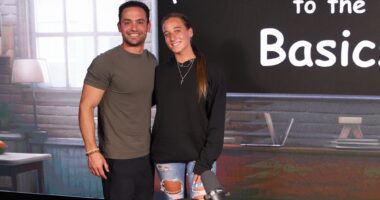Giving new meaning to “higher worship,” Sister Kate and her order of nuns produce premium CBD products that are popular around the world.
November 13, 2019 9 min read
This story appears in the October 2019 issue of Green Entrepreneur. Subscribe »
On a small farm in sleepy Merced, Calif., Sister Kate and a small order of nuns calling themselves the Sisters of the Valley are quietly cultivating, extracting, and distributing their CBD products to the tune of $1 million a year.
But Kate and her sisters aren’t ordinary nuns — at least, not in the traditional Catholic sense. These nuns model themselves after the French beguines, women in medieval times who lived and prayed together. Like nuns, Sisters of the Valley wear full habits and worship God but put the Mother Earth at the center of their spirituality. And their ultimate mission, according to Sister Kate, is “to get the most amount of medicine into the hands of the biggest amount of people, and to do it while building spiritual career choices and business ownership for women.”
How did this all come to be? We spoke with Sister Kate — real name, Christine Marie Katherine Meeusen — to find out.
RELATED: What Happens When AI Meets A Cannabis Grinder
What’s your origin story?
My history is pretty traditional. I was born and raised in Milwaukee. I married my second husband at the age of 30 and had three children. I ran a very successful consulting company, but my second marriage left me in total poverty with three middle schoolers. I was just your normal mom and corporate girl, and I went through this bad divorce and came to California.
I was raised with the Catholic nuns — I went to a Catholic school for eight years — and I always admired them. One could go down with the flu and another would take her place. There was nothing that could stop them on their mission. I was very influenced by them. But I never thought about being a nun myself. That didn’t come until the Occupy movement [in 2011]. And it really started [with erroneous reports that the U.S. Congress was declaring pizza a vegetable] and me saying, “Oh, hell, if pizza is a vegetable, then I’m a nun.” And so I went to an Occupy protest as sort of a protest nun.
You were protesting in a nun’s habit?
Yes, the traditional black-and-white. People and the media dubbed me Sister Occupy. I thought I’d had my 15 minutes of fame. [But then I started] delivering cannabis to sick people outside the protests. I really got in touch with my inner nun when I was bringing a guy who had two weeks to live his pot because that’s all he wanted, or bringing somebody who thought he was going to die cannabis plants to tend. And just understanding what the individual needed, comforting them on their way out or helping them find a reason to get out of bed again. I was doing all this through a traditional, old-fashioned collective that was allowed in those times. But I closed that business down because I realized it was never going to really grow. I wanted to get away from THC, and I wanted to get into something that was nonpsychoactive so I could bring in money from the outside world to this poor farm town.
So you weren’t against the psychoactive effects of THC; it was more a financial decision?
Yes, because if you look at the three years of revenue I did with the THC business, only being able to deliver it to the very sick and dying: Our first year was $30,000, our second year was $45,000, our third year was $70,000. Big deal. It will always be small, it will always be local, it will always be in the state [of California] and not reach the rest of the world.
In 2014, I got this great idea: I’m going to focus on a line of products that are less than 0.3 percent THC, made from hemp, so I can ship around the world. Now I just have to figure out how to grow it. I wanted a crop of nonpsychoactive cannabis, so I went to black market growers who I knew were planning an 80-plant grow operation.
I approached these guys and told them I wanted a quarter of the crop to be nonpsychoactive. Of course, they told me I was crazy, and that there was no way they were going to spend their time, nutrients, money, anything, on weed that doesn’t get you high. “You’re insane,” they said.
So I offered to guard it. I pretended I had a gun and had used a gun, even though I never had. And I went out and bought an RV so they would let me have a quarter of the crop. I guarded that crop like a fool. Obviously, about two weeks before harvest, there’s creepers around the property. I woke up to gunshots, and yes, I came very close to being killed. But it did give me the 15 pounds I needed to start my first line.
And here we are. We did more than a million in sales last year, and there’s only about eight of us working full-time.

Image Credit: Dwight Larks | Sisters of CBD
That’s all from hemp products?
Yes. Our CBD topical salve is our best-seller, and the next most popular is our coconut oil that you drop in your mouth. We work with just CBD. Even though we feel like we’re giving away half the medicine, staying under 0.3 percent THC is a way to get it to [more] people. Now we do ship around the world, except Canada; since they deregulated, they’re not letting anybody else’s products in.
Do you have a store? How do you distribute your product?
We have no brick-and-mortar. We don’t sell our medicine at trade shows. We work from our farm, and we use the post office.
You have a distinctive and specific method to growing your plant, right?
Every new moon, we start a batch of medicine and do a small spiritual ceremony. For the next two weeks, we go on a plant-based diet while we make that batch. At the full moon, we send a sample out for testing. Once it’s come back from the lab and the potency is right and the THC is low enough, then we have a little ceremony to move the medicines from the kitchen to the shipping room for packaging. Everything is done in prayer and contemplation and with chants and incense and ceremony around the moving of the medicine.
And you use cauldrons to cook your CBD?
They look like badass witches’ cauldrons, but really, they’re soup pots from restaurants. They top out at 130 degrees, and that’s what we needed because we found we could overcook the medicine and actually reduce the CBD potency.
RELATED: Is Hemp A Superfood? This Enterpreneur Bets His Business On It
So tell us a little bit about what the Sisters of the Valley believe.
We’re not affiliated with any traditional religion, mainly because they’re all patriarchal. We are independent. We call ourselves activist, anarchist, New Age, self-declared nuns. More officially, we consider ourselves beguine revivalists. The beguines were spiritual women in the early 1000s in Europe. They believed in women owning private property and would not affiliate themselves with any contemporary religion. They grew hemp and cannabis, and people came from far and wide to get their products because their hemp textiles and their hemp soaps and their cannabis medicines and their plant-based medicines were very effective, and they could be trusted. All the women here have a calling to plants, plant-based medicine, and Mother Earth.
Are you celibate, like Catholic nuns?
No. Our six vows are service to the people, obedience to the cycles of the moon, living simply, activism, chastity, and ecology. When it comes to chastity, we’ve chosen the definition that just privatizes your sexuality. So I can have sex; I just can’t tell you about it, or I’d have to kill you. [Laughs] It’s like that.
What do other nuns think of you?
We have a lot of support from the ex-Catholics. The existing Catholic nuns send us gifts and stand up for us, I think because now we’re four years into this and we’re not such a freak show. We’ve been able to convey that we’re true to our principles. The number one thing we hear from the Catholic nuns is that the work we do as activists couldn’t be done inside the patriarchy — kind of “Go, girl!” Right now, one thing I never thought I’d be doing is writing the Archbishop of Canterbury, but that’s what went on my to-do list today because [the Church of England] is going to be investing in [medical] cannabis businesses, and I think he can be helping us take women in England who are unemployed and get them involved in cannabis.
Take me through a day in the life of a Sister of the Valley.
Everything we do has to pass the test: Does it empower women or not empower women? If we had a very strict routine, we would all find that very disempowering. We very much value a quiet work environment and everybody staying in their own lane. We have lunch together on the farm, and that becomes our opportunity to exchange information or have a meeting if we need one. Other than that, everybody does their own thing. I like to get up and go to the gym in the morning. Sister Alice has fibromyalgia; you’ll never see her before 11. Sister Sarah is the ex-Catholic nun. She’s always up by 7 and she is always at her station by 8:30. But it’s very much an elegant, quiet dance we try to do and use the least amount of words but most amount of communication efficiency.
We have only three rules here. One is that we’re not allowed to show contempt — to anyone but lawmakers. Number two is “No surprises.” Three is “Always be camera-ready,” because we have an awful lot of media that comes here.









